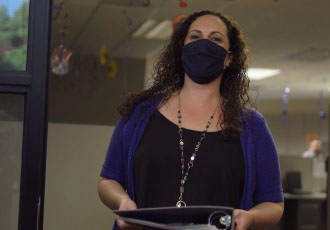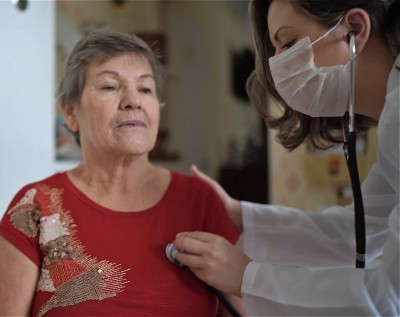‘As a Team, We Can Improve Anything,’ Say Performance Improvement Specialists
Avilla France, a performance improvement (PI) specialist for VITAS Healthcare, keeps a singular thought in mind as she identifies, analyzes, and devises ways to improve the quality of hospice care: “We have only one chance to get it right.”
End-of-life care involves intense emotions, difficult conversations, and never-to-be-forgotten experiences. Always aware of the singularity of the dying experience, Avilla embraces a can-do attitude to make sure she uses all of the data, feedback, insights, inspiration, creativity, and tools at her disposal to support her team in improving outcomes for patients and their families.
During a recent performance improvement project with her colleagues in Deerfield Beach, Florida, she used carnival themes, monthly employee ambassador meetings, a jelly-bean-counting contest, and a scavenger hunt to engage and excite her coworkers. The activities helped her team learn specific tactics to improve communication skills with patients and families.
“Quality hospice care encompasses effective communication with others, excellent symptom management, and ongoing training for families on how to care for their loved ones during this difficult time,” she says, as she reiterates: “We have only one chance to get it right.”
‘Identify Needs, Build Bridges, and Find Solutions’
National Healthcare Quality Week (October 17-23), designated by the National Association for Healthcare Quality, focuses on improving patient outcomes and preparing the industry for challenges and opportunities.
“Quality needs to be part of our everyday work,” explains Cathe Carlson, director of operations performance at VITAS. “Performance improvement specialists rely on data, a commitment to continuous improvement, a can-do attitude, and communication skills to identify needs, build bridges, and find solutions.”
To support interdisciplinary teams who provide direct care to patients, VITAS performance improvement specialists identify opportunities for improvement, and then develop, test, implement, and measure the plan of action.
They also evaluate results and identify solutions, leading to improved outcomes and standards of care.
Some specialists come directly from backgrounds in nursing or clinical care; Avilla, for example, was a medical-surgical nurse. Others come from non-medical professions—especially those undergoing constant change—that also focus on process and improvement.
Key PI Skills in Hospice Care
“With the ongoing pandemic, healthcare quality is even more important ,” says Carlson. “Performance improvement specialists focus on improving healthcare quality, which touches everyone: patients, their caregivers, staff members, and referral sources.”
Carlson and several VITAS performance improvement specialists—including Jen Hubert, MSN, BSN, RN, in Chicago; Shelly Huff, BSN, RN, in Philadelphia—join Avilla in identifying the skills needed to be an effective performance improvement specialist:
- An affinity for details and data
- Critical thinking skills, including a desire to uncover root causes, outages, oversights, and accompanying solutions. “A good PI specialist always goes one level deeper,” says Carlson.
- Excellent computer and communication skills, whether identifying and explaining current challenges/outages that require innovative solutions, or identifying and celebrating organic successes that can be replicated
- Ability to function autonomously, but with access to any and all colleagues who can contribute to the improvement plan
And what do they enjoy most about their jobs?
- “Any type of improvement that has a positive effect on patients and their families”
- “Being able to identify areas of improvement via team feedback, service comments, and caregiver survey responses”
- “Digging into the data and really peeling back the layers of the onion to identify challenges and opportunities for improvement”
- “Being part of a program where your contributions create tangible improvements”
- “Using data to help my coworkers visualize our challenges and understand how we’re improving”
- “The professional satisfaction of creating positive, measurable, tangible results”
“It’s very rewarding to see the difference you can make behind the scenes in helping ensure that patients receive the best care,” says Jen. “I love the satisfaction of knowing that our VITAS patients are receiving excellent care and that I’m part of the process that makes that possible.”

The VITAS Employee Promise
Behind every patient success story at VITAS—every last wish fulfilled, every loving memory made—is a team of compassionate, expert professionals doing their best to make a difference.
How VITAS Supports Our Employees Sign Up for Career News

